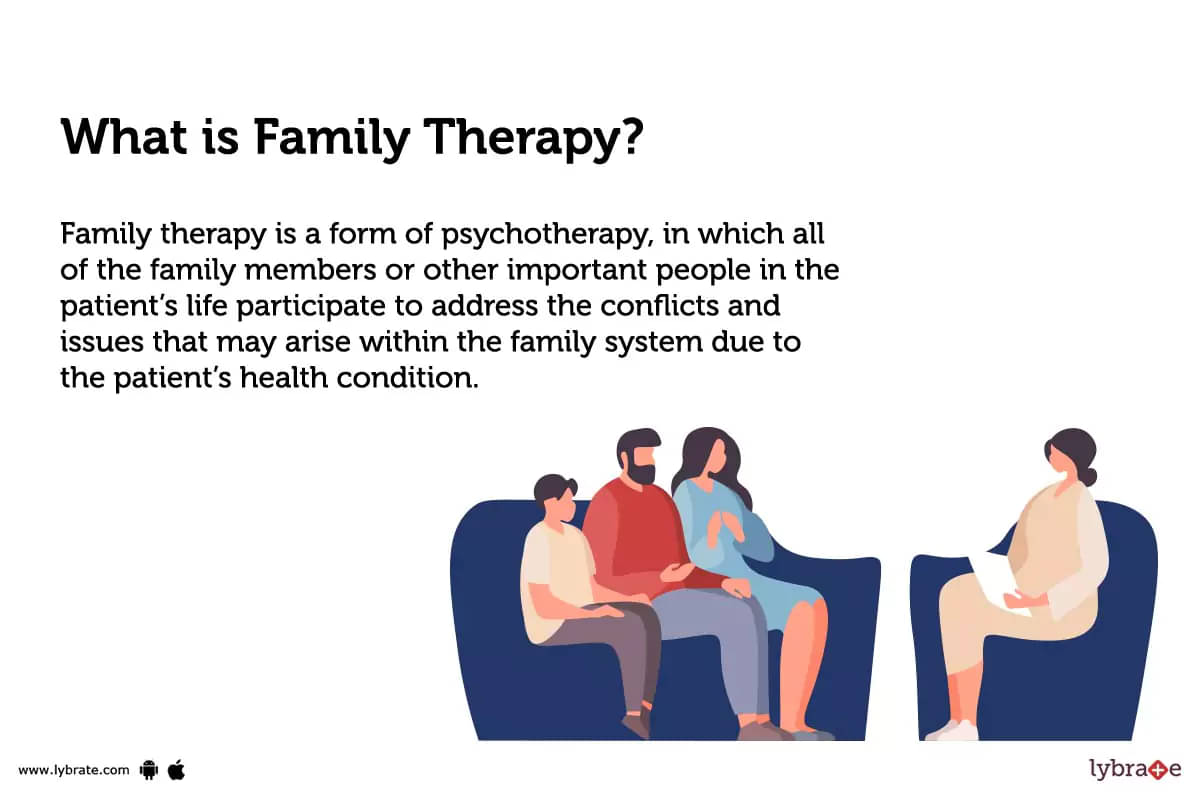Family Therapy: Causes, Symptoms, Treatment, and Cost
Last Updated: Apr 04, 2023
What is Family Therapy?
Family therapy is a form of psychotherapy, in which all of the family members or other important people in the patient's life participate to address the conflicts and issues that may arise within the family system due to the patient's health condition. It is based on the belief that the family unit is a unique social system with its own patterns of communication, behaviors, and roles that impact the individual's emotional and psychological well-being.
The goal of family therapy is to improve relationships and communication among the patient’s family members. Family therapists use a variety of approaches and techniques to help families work through their problems, including systemic therapy, structural therapy, and psychodynamic therapy.
The therapy process typically involves one or several sessions where the therapist meets with the family members and helps them understand and express their thoughts, feelings, and behaviors. The therapist facilitates open communication and helps family members work through their conflicts in a supportive and non-judgmental environment.
Family therapy can be used to treat a variety of problems, including ones with relationships, communication, behavior, mental health, and addiction. It is especially useful for families who have a member with a mental health condition, as it helps them understand and support the individual while addressing any related family issues.
What are the types of Family Therapy?
Family therapy is a diverse field, and there are several approaches that therapists use to help families work through their issues. The most often used types of family therapy include;
Structural Family Therapy
Structural family therapy focuses on the connections and behavioral patterns within a family. It looks at the family as a system and identifies the various roles and power dynamics that exist within the family. The therapist works to restructure the family system to improve communication and resolve conflicts.
Strategic Family Therapy
Strategic family therapy is solution-focused and aims to help families identify and implement specific changes to improve their relationships and resolve conflicts. The therapist collaborates with the family to create strategies and plans of action to accomplish particular objectives.
Systemic Family Therapy
Systemic family therapy views the family as a system and focuses on the patterns of communication and behavior that exist within the family.
The therapist works to help the family understand the impact of their behaviors on each other and to identify ways to change those behaviors to improve relationships.
Psychodynamic Family Therapy
Psychodynamic family therapy is based on the idea that a person's emotions and behaviors are rooted in their past experiences, particularly those within the family. The therapist works with the family to uncover unconscious patterns and dynamics and helps family members understand how these patterns are impacting their relationships.
Cognitive-Behavioral Family Therapy
This therapy focuses on helping families change negative thought patterns and behaviors. The therapist collaborates with the family to identify, confront, and replace harmful beliefs and actions with more constructive ones.
These are some of the varieties of family therapy that are most frequently employed. The type of therapy that is most appropriate for a particular family depends on the specific issues they are facing and the therapist's training and expertise.
Why is it done?
Family therapy is done to help families work through a range of issues and improve their relationships. It is based on the belief that the family unit is a unique social system with its own patterns of communication, behaviors, and roles that impact the individual's emotional and psychological well-being.
When a family experiences problems, it can have a profound impact on all members, and family therapy provides a safe and supportive environment for families to work through these issues together.
What can you expect?
In a helpful and nonjudgmental setting, family therapy will allow you and your family to talk openly about your thoughts, feelings, and actions. The therapist will facilitate communication and help you and your family members understand each other's perspectives.
During the therapy sessions, you can expect to work through conflicts, improve relationships, and develop new strategies for improving communication and resolving issues.
How Can Family Therapy Help?
Family therapy can help families in a variety of ways. It can improve communication and resolve conflicts, help families understand and support a member with a mental health condition, and address a wide range of issues, including relationship problems, communication difficulties, behavioral problems, mental health issues, and substance abuse. Family therapy can also help families develop new coping strategies, improve their relationships, and promote overall well-being.
What is the Goal of Family Therapy?
The goal of family therapy is to address the conflicts and issues that arise within the family system and to improve relationships and communication among family members. The therapist works with the family to identify problem areas, develop new strategies for resolving conflicts, and improve overall well-being. The ultimate goal is to help families create a supportive and positive environment where all members can thrive.
What are the Benefits of Family Therapy?
Family therapy offers a wide range of benefits for families facing challenges and conflicts. Some of the key benefits include;
Improved communication
Family therapy provides a safe and supportive environment for families to work on their communication skills and improve their relationships.
Resolved conflicts
Through family therapy, families can work through their conflicts and find solutions that benefit all members.
Improved mental health
This therapy can help individuals with mental health conditions and their families understand and support each other, leading to improved well-being.
Increased support
Under family therapy all the participating family members get a supportive environment where they can work through their challenges and develop stronger bonds.
Better understanding
Family therapy can help families understand each other's perspectives and behaviors, leading to improved relationships.
What are the Techniques of Family Therapy?
A range of approaches are employed by family therapists to assist families in resolving their problems. Some of the most common techniques include;
- Active listening: The therapist encourages families to listen to each other and understand each other's perspectives
- Reframing: The therapist works with families to transform negative ideas and actions into constructive ones
- Role-playing: The therapist may have family members act out certain scenarios to help them understand each other's perspectives and work through conflicts
- Behavior modification: The therapist may help families change negative behaviors to improve relationships
- Communication skills training: To strengthen their bonds, the therapist may provide families new communication techniques.
What Family Therapy Can Help With?
Various concerns can be helped by family therapy, such as;
- Relationship problems
- Communication difficulties
- Behavioral problems
- Mental health issues
- Substance abuse
- Conflict resolution
- Coping with major life changes
- Improving family dynamics
What things to Consider for Family therapy?
There are a few crucial things to take into account while thinking about family therapy, including;
Finding the right therapist
It's important to find a therapist who is experienced in family therapy and who you feel comfortable working with.
Scheduling
This therapy usually involves regular sessions, so it's important to find a schedule that works for all family members.
Cost
Family therapy can be expensive, with costs ranging from 300 to 3,500 Rupees per session for all members together in India. It's crucial to think about the price and whether your insurance will pay for therapy.
Commitment
Family therapy requires a significant investment of time and energy, so it's important to be committed to the process.
Openness
Family therapy works best when all members are open to the process and willing to work on their relationships.
Conclusion
Family therapy is one of the most useful tools for families facing challenges and conflicts. By providing a supportive and non-judgmental environment, family therapy helps families improve their communication, resolve conflicts, and develop stronger relationships. With the help of trained therapists, families can work through a wide range of issues and achieve their goals.
While it requires a significant investment of time and energy, the benefits of family therapy can be long-lasting and can lead to improved well-being for all members of the family. Whether your family is facing relationship problems, behavioral issues, or mental health conditions, family therapy can provide the support and guidance needed to improve your relationships and foster a positive family dynamic.
References
- Becvar DS, Becvar RJ. Family therapy: A systemic integration. Pearson Education; 2013. [Cited 29 July 2019]. Available from:
- Goldenberg H, Goldenberg I. Family therapy: An overview. Cengage learning; 2012. [Cited 29 July 2019]. Available from:
- Dry eyes- Mayo Clinic [Internet]. mayoclinic.org 2019 [Cited 29 July 2019]. Available from:
Table of content
15+ Years of Surgical Experience
All Insurances Accepted
EMI Facility Available at 0% Rate
Find Psychiatrist near me
Ask a free question
Get FREE multiple opinions from Doctors


